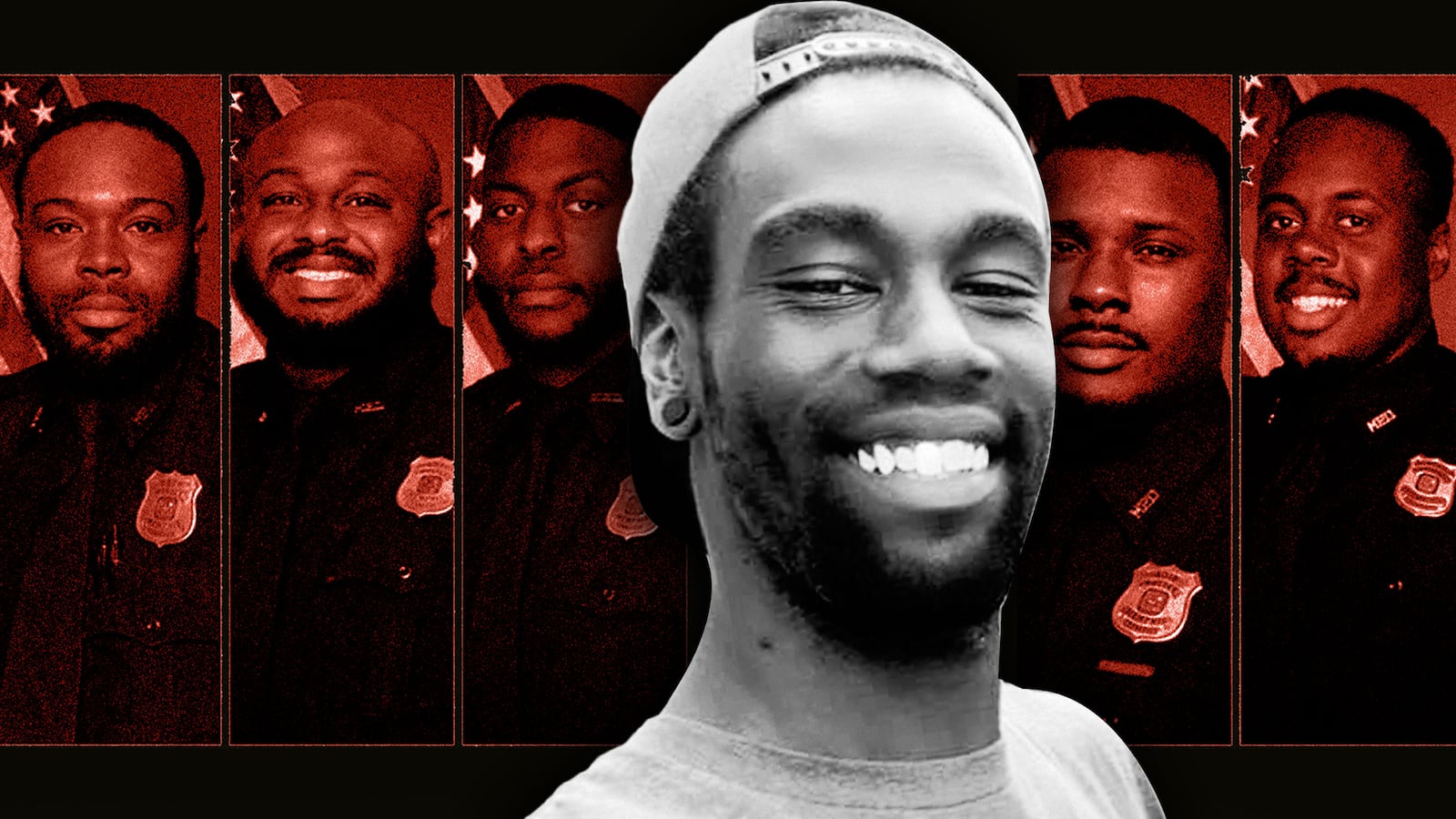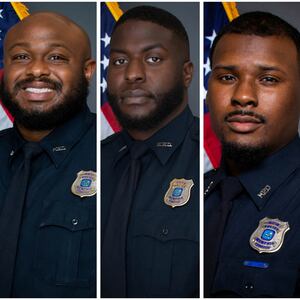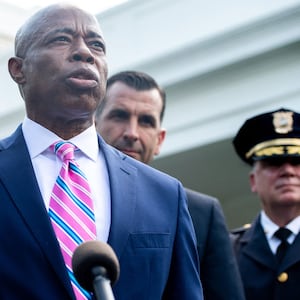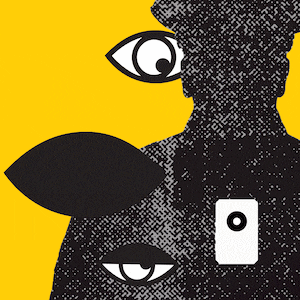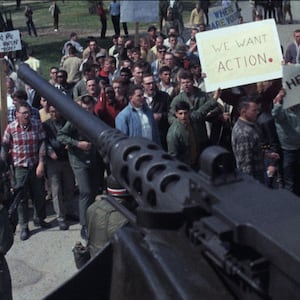On Thursday, Shelby County District Attorney Steve Mulroy announced that his office has brought charges against the five officers involved in the death of 29-year-old Tyre Nichols: second-degree murder, acting in concert of aggravated assault, two aggravated kidnapping charges, two official misconduct charges, and official oppression. “While each of the five individuals played a different role in the incident in question, the actions of all of them resulted in the death of Tyre Nichols.”
“We want justice for Tyre Nichols,” Mulroy added. “If there’s any silver lining to be drawn from this very dark cloud, it’s to start a conversation about police reform.”
Mulroy says the city will release video from the attack sometime after 6pm Friday.
“He was a human piñata for those police officers,” a lawyer for Nichols’ family, Antonio Romanucci, said Monday after the family watched video of their son’s attack by the police officers. “Not only was it violent, it was savage,” he said, as Nichol’s mother started crying and repeated “Oh my God.” Nichols’ mom apparently couldn’t bear to watch more than a minute of the three-minute attack.
The officers were fired after an investigation. Memphis Police Chief C.J. Davis said they had violated department policies, including use of excessive force. “The egregious nature of this incident is not a reflection of the good work that our officers perform, with integrity, every day,” said Davis in a statement.
Kevin Ritz, U.S. Attorney for the Western District of Tennessee, announced a civil rights investigation into Nichols’ death. The Tennessee Bureau of Investigation is investigating. The United States Attorney’s Office, in coordination with the FBI Memphis Field Office and the Civil Rights Division of the Department of Justice, has opened a civil rights investigation.

The District Attorney’s office has emphasized its commitment to due process. “We're going to go by the facts and the law,” Mulroy told ABC News. The newly-formed Judicial Review Unit—staffed with prosecutors who don’t regularly work with the Memphis Police Department—recommend the charges.
This is how you do it. You give the officers due process. But you don’t serve as their defense attorney. Better still, how you do it is by weeding out abusive cops before they kill. But it’s still notable that officials in a red state (albeit in a purplish city) appear more committed to accountability for police officers than they are in a deep blue city in a blue state, like New York City.
In New York, it took five years for Eric Garner’s killer, Officer Daniel Pantaleo, to lose his job after placing him in a chokehold, causing Garner to desperately plead, “I can’t breathe,” before losing consciousness and dying.
After police in 2006 fired 50 bullets, killing Sean Bell, the NYPD’s commissioner put five officers on paid leave—stripped of their weapons, but keeping their jobs. At the time, The New York Times described this as “forceful” discipline.
When NYPD officers shot dead Saheed Vassall in 2015, after he pointed what they thought was a gun that turned out to be a metal pipe, the attorney general’s office found the NYPD officers who shot Mr. Vassell were legally justified in their actions since “the use of deadly physical force is necessary to defend the police officer or peace officer or another person from what the officer reasonably believes to be the use or imminent use of deadly physical force.”
Meanwhile, NYPD officers with a long history of breaking the rules (as well as the law) frequently keep their jobs and cushy pensions.
Sgt. David Grieco, nicknamed “Bullethead,” retired this year, after being sued 24 times and racking up a whopping $1 million in settlements (paid for by taxpayers), primarily for excessive force. Grieco also had 101 allegations against him clocked with the Civilian Complaint Review Board (CCRB).
The CCRB, after conducting thorough investigations, occasionally suggests termination. But virtually every time, the police captain rules that an accused officer is either “not guilty,” or decides to take away a few days of vacation. The most common punishment is more training.

According to CCRB data, 40 percent of NYPD officers have no CCRB complaints against them. Ten percent have complaints number at least in high double digits. Det. Gary J. Messina has 95; Lt. Henry A. Daverin has 95; retired Commander Det. Anthony R. Ronda has 69; Det. Mathew C. Reich has 104; and former Lt. Eric Dym has 119 complaints against him. Note these are all high ranks, so these officers get paid the highest salaries, even as they cost taxpayers numerous lawsuit payouts.
“The NYPD has a lot to learn,” Frank Serpico, the whistleblower whose revelations launched the Knapp Commission and earned him a bullet to the head, tells The Daily Beast. “It is more interested in protecting its image than exposing corruption.”
In seminal moments where extreme police abuse is revealed—almost always caught on horrifying video—there’s a public reckoning. It comes in the form of protests, and in some cases, rioting. Reforms are promised, and sometimes they’re even implemented.
And that’s almost immediately followed by a backlash. After the George Floyd protests, conservatives and some liberals embraced the so-called Ferguson Effect, which is the ridiculous idea that protests lead to crime spikes because officers are too scared to go after criminals. The backlash, as well as politicians’ terror of angering the police unions in blue cities, kills any efforts at substantive reform—even reforms that have already been agreed upon.
“The reforms that have been implemented have been mostly procedural and technological, like a change in wording of use of force policies or the addition of body cameras,” Alex Vitale, CUNY Brooklyn sociology professor, and author of “The End of Policing,” tells The Daily Beast. “Things like new training have been implemented, but have failed to show any meaningful impact.”
The NYPD’s public outrages have been many, but not few meaningful reforms have been implemented.

“They did a round following the Stop and Frisk lawsuit and protests and after Eric Garner—such as body cameras, implicit bias training and de-escalation training,” Vitale says. “The Department's own research showed that implicit bias training didn't work,” he adds. “There hasn't been any evaluation of the other reforms but there isn't a lot of cause for optimism, especially given the way officers behaved during the George Floyd protests.” (A city watchdog group’s investigation found that NYPD engaged in “excessive enforcement” that escalated tensions.)
More serious reforms have been rolled back. Following widespread outrage over the death of George Floyd, Police Commissioner Dermont Shea disbanded the plainclothes unit in 2020—which had been linked to some of the NYPD’s most notorious violent incidents, including the deaths of Diallo, Garner, Bell, and Vassall. Mayor Eric Adams—a former NYPD captain—promptly brought them back upon taking office in 2022.
The brutality inflicted on Tyre Nichols is sufficient evidence that the Memphis PD badly needs reform and greater accountability. But New York (and other cities) can learn from Memphis’ example.
When someone dies in police custody, don’t circle the wagons and allow police unions to poison the wells of public opinion with endless misleading claims while the officers in question continue to collect a paycheck.
Instead, investigate. Give the officers a chance to defend themselves. And if the evidence proves police broke the law (as the charges against the five Memphis officers demonstrate), then fire those cops and prosecute them to the fullest extent of the law.
That’s how you avoid widespread civil unrest. That’s how you rebuild public trust in law enforcement, a necessary element of public safety. And it’s how you send the message to all police officers that the law applies to them, too.

